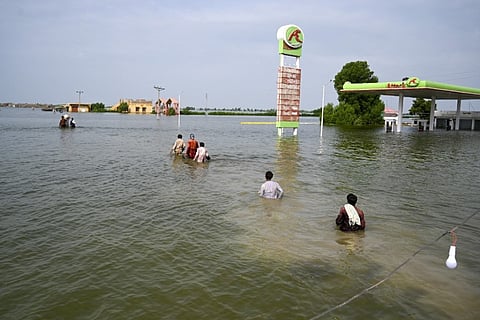
- NEWS
- the EDIT
- COMMENTARY
- BUSINESS
- LIFE
- SHOW
- ACTION
- GLOBAL GOALS
- SNAPS
- DYARYO TIRADA
- MORE

FAZILPUR, Pakistan (AFP) — The stench of decay hangs over a makeshift camp in Pakistan's south, where hundreds of locals have sought shelter from the devastating monsoon floods that have put nearly a third of the country under water.
In Punjab province, dozens of tents are perched in the area around a small rural railway station — the only dry land on a horizon of water, reached only by a sliver of road.
The odor is a heady mix of rotting vegetation from drowned crops, leftover food scraps and garbage — as well as the accumulated excrement of the hundreds of people and livestock gathered there.
"There is no place for showering or going to the bathroom," Zebunnisa Bibi, forced to flee with her family two weeks ago when floodwater inundated her village, said.
Similar tent camps have mushroomed across the south and west of the country. The worst flooding in the country's history has covered an area the size of the United Kingdom and affected 33 million people — one in seven Pakistanis.
A lack of functioning toilets at these camps is one of the biggest issues — posing a health hazard for all, but misery in particular for women and girls.
Zebunnisa said she was "deeply ashamed" at having to relieve herself in the open — especially after she caught a man watching her as she lowered her shalwar kameez behind a tree.
Shameen Bibi expressed similar sentiments.
"Where can I send my daughters alone? When we squat to relieve ourselves, we get scared that some man might come."
Swarms of flies and mosquitoes add to the misery, creating an environment ripe for a breakout of disease and infection.
